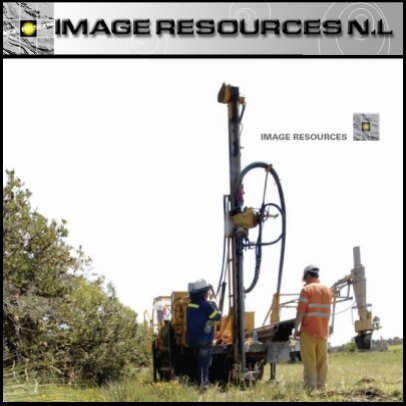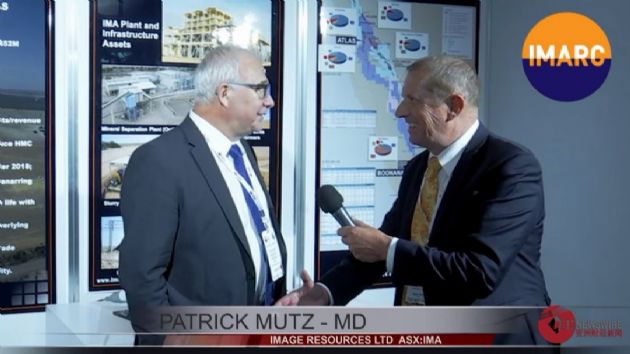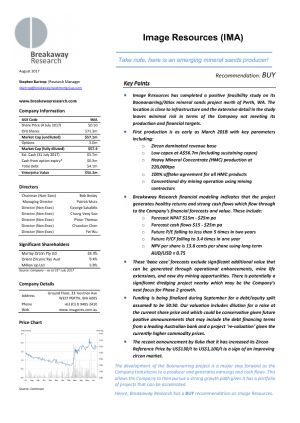
Image Resources (ASX:IMA) Quarterly Report For The Period Ending 30 September 2009
Perth, Nov 2, 2009 AEST (ABN Newswire) - Image Resources (ASX:IMA) has updated the resource at the Atlas heavy mineral (HM) deposit resulting in a significant upgrade summarised as follows:
- Change in resource category of heavy minerals and mineralisation to indicated from a mix of inferred and indicated.
- Over 120% increase in tonnes of zircon from 46,000 tonnes to 102,000 tonnes.
- 40% Increase in heavy mineral tonnes from 650,000 to 910,000 tonnes.
- 11% increase in grade from 5.8% to 6.2%
These changes represent a significant upgrade to the Atlas resource, which is expected to markedly increase the net present value of the project. Atlas is 7km long and up to 400m wide and is one of our better high grade resources.
The sample density is sufficient to support an indicated resource category for the tonnes of heavy mineral and mineralised material. However, there is limited mineral assemblage data available, and therefore the tonnes of ilmenite, rutile, zircon et al are classified as inferred. Many more samples will be analysed, allowing the resource category for the mineralogy to be upgraded to indicated. Also, the analysis of the suitability of the ilmenite for synthetic rutile feed will be addressed.
Whilst the Atlas resource represents the company's most advanced resource, it is only a tiny portion of its resource base which is targeted to expand by at least 2 times after the company drills out the remaining 300km of targets identified to date.
EUCLA BASIN (Image 100%)
Image Resources has completed a 402-hole, 16,308m aircore drilling programme at Serpentine Lakes in the Eucla Basin, following up its previous drilling which intersected significant thicknesses of zircon-rich heavy minerals (HM). Zircon comprises up to 45% of the HM assemblage (IMA ASX releases 30/10/2008 and 11/02/2009) and is of great significance because it is the highest value mineral normally found in HM deposits (approximately 10 times the value of ilmenite).
In addition, the material has very low slime values (range 1.8-7.6%, average 4.2%), Low slime content is important because the material is easier to treat and operating costs of mining are reduced.
To date some 2066 of 4304 samples (1 or 2m intervals) selected for laboratory processing have been completed, with Table 3 showing those intersections exceeding 1.0% HM. Significant results include:
- Hole SL249; 16m @ 4.4% HM from 12m, including 3m @ 10.1% HM from 24m
- Hole SL301; 8m @ 5.0 % HM from 26m, including 2m @ 12.4% HM from 28m
- Hole SL350; 12m @ 3.9% HM from 20m, including 3m @ 8.4% HM from 25m
- Hole SL373; 17m @ 4.4% HM from 13m, including 3m @ 10.7%HM from 18m
- Hole SL390; 10m @ 5.3% HM from 12m, including 2m @ 10.2%HM from 19m
Two distinct zones of mineralisation are recognised within the Cyclone Extended HM prospect which abuts Diatreme Resources' Cyclone resource to the north as shown in Figure1. Based on the drilling completed to date, the western zone of Cyclone Extended has been closed off to the south. The main body of this zone is 2km long and 800m wide, and there is a ~200m wide extension to the south for a further 750m.
However the eastern zone, about 800m wide, remains open to the south and probably extends up to 4.5km within the Image tenements.
The drillholes shown in Figures 1 and 5 and are coloured by metal factor (intersected thickness x grade in m%HM). The metal factors are based on a mix of laboratory and visual estimates at this stage. Metal factors greater than 40m% are shown in magenta, 20-40m% in red, 7-20m% in orange, 2-7m% in green, and less than 2m% in blue.
The cross sections in Figures 2 and 3 show the mineralisation along four new traverses at Cyclone Extended. Some of the more significant intersections are annotated and thicknesses between 9m and 17m are shown. Laboratory results from all of the holes above the mineralised zones shown on the sections have yet to be received. Past experience has shown that panned estimates are significantly lower than heavy media separation results for samples from this zone, and intersections exceeding 20m thickness are not uncommon in the previous Image drilling in this area. As a result, it is anticipated that the final thicknesses of mineralisation will be even greater than those shown on the sections.
These new results highlight that Cyclone Extended is a potentially economic discovery, particularly when considered with Diatreme's contiguous Cyclone deposit, which together extend for some 10km in length. This combined mineralisation deposit is a significant size on a global scale and can be compared favourably with the Jacinth-Ambrosia deposits in the Eucla Basin.
Additional mineralisation has been identified about 1.5 km east of Cyclone Extended that requires more drilling to define its extent. Some 20km east of Cyclone Extended further HM mineralisation has been identified at the Monsoon prospect as shown in Figure 4. The area between Cyclone Extended and Monsoon remains prospective for additional mineralisation. Wide spaced stratigraphic holes to the south of Cyclone Extended intersected significant thicknesses of the sediment that hosts the mineralisation at Cyclone Extended. Interpretation of the drilling in the centre of the tenements indicates the palaeo-shorelines trend across the scout drill profiles, although no significant mineralisation was intersected in the wide spaced holes. This area will be investigated further in the next phase of exploration.
Figure 5 shows the Monsoon prospect in more detail. The mineralisation at Monsoon has been traced for over 2.5km and is open to the south-east, but for approximately 2km to the north-west the beach sediments appear to have been eroded by the drainage system that today forms the Serpentine Lakes. The strandlines are interpreted to extend across the state border with South Australia, and into a conservation park. Laboratory processing of samples from Monsoon is in progress prior to assessing the significance of this mineralisation.
When sample processing is complete, mineral assemblage studies and resource estimation will commence. Image anticipates that the grades and continuity of mineralisation indicated from the drilling to date will allow the estimation of inferred resources for Cyclone Extended and Monsoon. Following this it is anticipated that a scoping study will be carried out to assess the economic potential of the project.
Further drilling may then be undertaken to outline the full extent of the mineralisation and to investigate the mineralisation potential of the paleo-shorelines between Cyclone Extended and Monsoon where a 10km-long target area has been identified.
For the complete Image Resources Figures and Quarterly Report for the period ending 30 September, please click the link below:
http://www.abnnewswire.net/media/en/docs/61680-ASX-IMA-467233.pdf
About Image Resources NL
 Image Resources NL (ASX:IMA) is a mineral sands focused mining company operating an open-cut mine and ore processing facility at its 100%-owned, high-grade, zircon-rich Boonanarring Project, located 80km north of Perth in the infrastructure rich North Perth Basin.
Image Resources NL (ASX:IMA) is a mineral sands focused mining company operating an open-cut mine and ore processing facility at its 100%-owned, high-grade, zircon-rich Boonanarring Project, located 80km north of Perth in the infrastructure rich North Perth Basin.
Boonanarring is arguably one of the highest grade, zircon-rich mineral sands projects in Australia. Construction and project commissioning were completed on-time and on-budget in 2018. Production commenced in December 2018 and HMC production ramped-up to exceed name-plate capacity in only the second month of operation.
| ||
|







